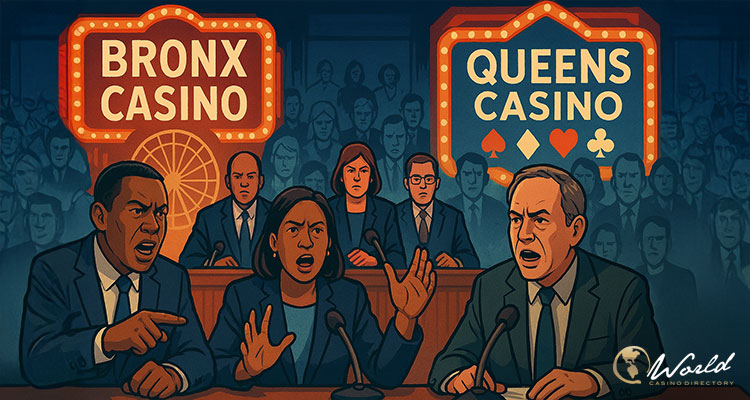With only weeks left before community advisory boards must issue recommendations to state regulators, emotions ran high this week at public hearings in Queens and the Bronx. Residents, activists, union representatives, and local officials clashed over two multibillion-dollar casino proposals, each positioned as a potential economic boon but criticized as a threat to neighborhoods and public parkland.
In the Bronx, Bally’s Corporation has pitched a $4 billion casino complex at Ferry Point Park. The plan drew 88 speakers at a packed meeting in Throggs Neck. Meanwhile, in Queens, about 200 people gathered at Borough Hall in Kew Gardens to debate Metropolitan Park, an $8 billion vision from New York Mets owner Steve Cohen and Hard Rock International to convert Citi Field’s 50-acre parking lot into a gaming and entertainment resort.
Both projects are competing for one of just three New York downstate casino licenses that the state Gaming Facility Location Board is expected to issue later this year. Advisory committees made up of six members appointed by local officials will decide by the end of September whether to recommend each bid, with a two-thirds majority required for approval.
Jobs, Promises, and Parkland Concerns
Supporters of both projects emphasized job creation, infrastructure investment, and community benefits. Opponents countered with warnings about gambling addiction, crime, traffic, and the loss of public green space.
Bally’s has pledged $625 million in local improvements, including new schools, green spaces, infrastructure upgrades, and a $75 million investment in MTA bus stops. Cohen’s Metropolitan Park proposal offers $1.75 billion in community commitments, such as $480 million for a new Willets Point subway station and $320 million to build and maintain a 25-acre public park.
Union members and small business owners showed up in force to voice support, often receiving loud applause, according to The City. David Sands of the International Brotherhood of Electrical Workers countered critics who accused developers of buying loyalty: “We are going to follow the money — we’re going to follow the money to good-paying jobs.”
But skepticism ran deep. Annie Lo, an attorney with the Asian American Legal Defense and Education Fund, cautioned that “community benefits are rarely enforceable promises.” She added, “We’ve been told that this casino will come with community benefits, but we know through experience that developer-promised benefits are a myth.”
Bronx Debate Turns Contentious
In The Bronx, opposition was especially vocal. Councilmember Kristy Marmorato condemned Bally’s plan, declaring, “They want gamblers. They do not want neighbors.” Her remarks drew both cheers and jeers, forcing the advisory committee chair to threaten to eject audience members.
Despite her resistance, Assemblymember Amanda Septimo endorsed the project, framing it as a chance for The Bronx to shed negative stereotypes. “If we’re ever going to change that, then we have to take charge, and this is the opportunity to do that,” she said.
Mayor Eric Adams has already stepped in twice to bolster Bally’s chances, including vetoing a City Council rejection of necessary land-use changes. If Bally’s prevails, the project would also generate a $115 million windfall for the Trump Organization under a prior deal involving the Ferry Point golf course.
Citi Field Plan Draws Strong Reactions
At Queens Borough Hall, 79 people testified on Cohen’s plan, with supporters outnumbering opponents by roughly two to one. Proponents argued the project would create 23,000 union jobs and transform the local economy. “This is about the future,” said civic leader Ken Cohen, adding, “This is win-win-win.”
Tom Grech, head of the Queens Chamber of Commerce, called the jobs “transformational,” stressing that they would provide long-term stability for families. Business owners like Robert Dorsky, who operates a Flushing restaurant, envisioned new opportunities to attract customers.
Opponents were unconvinced. Jean Silva of the Flushing Meadows Corona Park Conservancy opposed handing over public parkland, stating, “I’m against giving away any parkland for any reason.” Others described personal pain from gambling addiction, while critics held signs reading, “WHY IS YOUR MONEY LOUDER THAN OUR VOICES” and “NO MEANS CASINO.”
The night ended with a tearful plea from a 16-year-old Flushing resident who warned, “Gambling is an addiction. My home is not a destination for tourists to see a fleeting thrill while generations are ravaged right next door.”
Decision Deadline Approaches
The advisory committees must submit recommendations by September 30. While political observers believe Cohen’s Citi Field plan is among the strongest bids, the final decision rests with the state Gaming Commission. Two licenses are expected to go to existing racetrack casinos in Queens and Yonkers, leaving one hotly contested slot for projects in Coney Island, Times Square, Manhattan’s East Side, and Citi Field.
State Senator Brad Hoylman-Sigal, a critic of casinos in the city, nonetheless admitted Cohen’s proposal “has a very good shot.” By contrast, a recent poll showed two-thirds of New Yorkers oppose the Times Square casino plan, signaling an uphill battle for rival bidders.
As the clock ticks down, the competing visions for Ferry Point Park and Citi Field underscore a broader debate: whether casinos represent long-term revitalization or short-term risk for New York’s neighborhoods.


